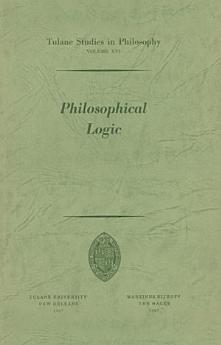Philosophical Logic
Robert L. Arrington · Peter M. Burkholder · Shannon Dubose · James W. Dye · James K. Feibleman · Bertrand P. Helm · Max Hocutt · Harold N. Lee · Louise N. Roberts · John C. Sallis · Donald H. Weiss
Dec 2012 · Tulane Studies in Philosophy Book 16 · Springer Science & Business Media
eBook
162
Pages
reportRatings and reviews aren’t verified Learn more
About this eBook
With this issue we initiate the policy of expanding the scope of Tulane Studies in Philosophy to include, in addition to the work of members of the department, contributions from philosophers who have earned advanced degrees from Tulane and who are now teaching in other colleges and universities. The Editor THE LOGIC OF OUR LANGUAGE ROBERT L. ARRINGTON Wittgenstein wrote in the Tractatus that "logic is not a body of doctrine, but a mirror-image of the world. " 1 In line with his suggestion that a proposition is a 'picture', Wittgenstein argued that propositions 'show' the logical structure of the real. He was insistent, however, that "the apparent logical form of a proposition need not be its real one. " 2 As a result of this we can misunderstand the structure of fact. Philosophical problems arise just when "the logic of our language is mis understood. " 3 It is common knowledge that much of this view of logic was rejected by Wittgenstein himself in the Philosophical Investi gations. There we are told that language has no ideal or sublime 4 logic which mirrors the structure of the extra-linguistic world. Consequently, inferences from the structure of language to the structure of that extra-linguistic world are invalid. Reality can be 'cut up' in any of a number of ways by language. Wittgenstein adopted a view of philosophy which would render that discipline a non-explanatory, non-critical study of the multiple ways in which language can be used.
About the author
Born in New Orleans, Louisiana, in 1904, James Feibleman is a prolific author who has published nearly 50 books of poetry, novels, autobiography, but mostly serious philosophy. He attended the University of Virginia for several years, but did not graduate. From 1925 to 1929, Feibleman was the assistant manager of a department store. He then resumed his education in Europe during the 1930s. During World War II, Feibleman was a professor of English at Tulane University, later becoming chair of the department of philosophy from 1952 to 1969. His major endeavor was formulating a system of philosophy that rested on the ontological foundations of realism harking back to Plato the idea that there is an a priori argument for existence but that incorporated modern science. The outline of Feibleman's system was expounded in his massive Ontology (1951) but was elaborated in a number of volumes in special areas such as aesthetics, ethics, political philosophy, and legal philosophy. Feibleman also published several books on popular philosophy. In addition to his active career in philosophy, Feibleman was a successful businessman. From 1930 until 1954, he was vice president and general manager of James K. Feibleman Realty Company. He was a major partner in the Leopold Investment Company (1954-1971).
Donald H. Weiss, Ph.D., is president of Self-Management Communications, Inc. and has been a training and development executive and consultant for more than 30 years. In addition to consulting work, he has held management positions with Citicorp, Millers Mutual Insurance, and Equitable. He has many books include the first two editions of Fair, Square & Legal, Why Didn't I Say That?, Secrets of the Wild Goose, and The Self-Management Workshop: A Trainer's Guide. He lives in the St. Louis area.
Rate this eBook
Tell us what you think.
Reading information
Smartphones and tablets
Install the Google Play Books app for Android and iPad/iPhone. It syncs automatically with your account and allows you to read online or offline wherever you are.
Laptops and computers
You can listen to audiobooks purchased on Google Play using your computer's web browser.
eReaders and other devices
To read on e-ink devices like Kobo eReaders, you'll need to download a file and transfer it to your device. Follow the detailed Help Centre instructions to transfer the files to supported eReaders.







